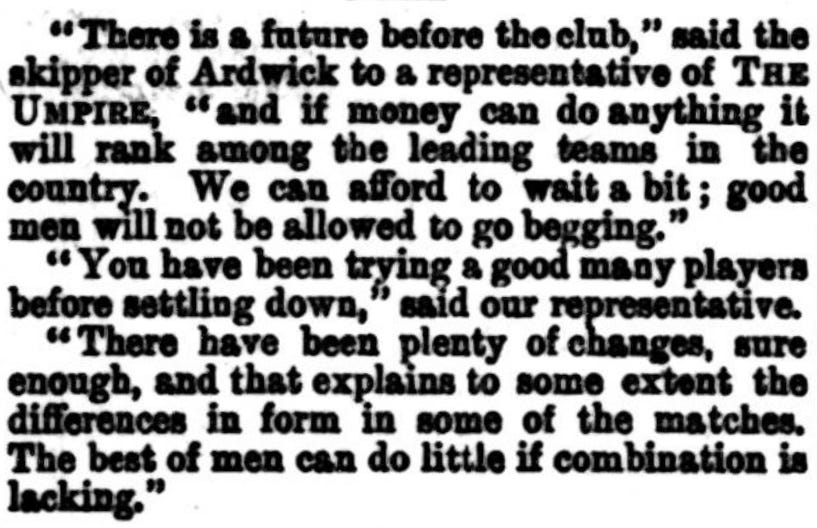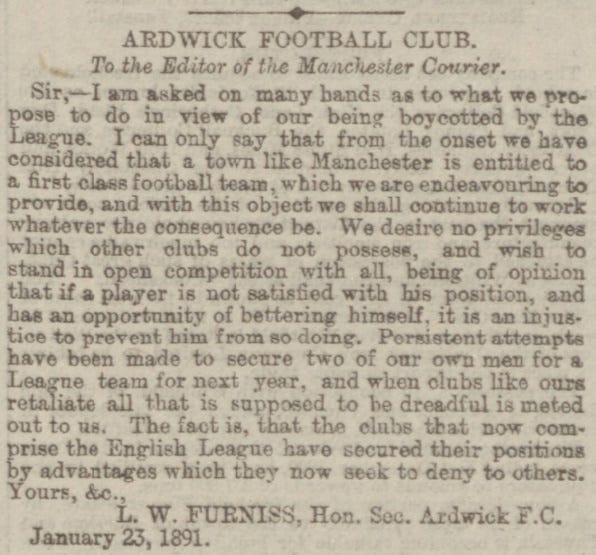When City Fell Foul of Edwardian Financial Fair Play (Pt 13)
Thirteen: Why Always Us?
I’ve always been sceptical when people talk about the DNA of a football club. My view is that, as a football club is not a living being, it doesn’t have any DNA. Or a heart or soul for that matter.
Nor are the supposed traditions of certain clubs really as embedded as their fans might think. The so called “United way” of playing football really just reflects the fact that wealthiest clubs have traditionally bought the best attacking players (I also can’t recall any United fans moaning about the “United way” being betrayed after they packed their midfield for the entire 2024 FA Cup Final).
Those “Anfield nights” really are not unique, while I’m still completely at a loss as to why Everton call themselves “The People’s Club”.
And, of course, “Typical City” really isn’t at all typical.
That said, being singled out for charges from football’s authorities is not untypical for us. While it might be a stretch to call it a club tradition, there are some recurring themes in our relationship with football’s governing bodies over the years. Certainly, City’s rise to League status bears some striking similarities to our rise to four-in-a-row league champions.
Back in 1890 City (then called Ardwick) were a semi-professional club not even in the top hundred in the country. Their Hyde Road ground had no stands, while its sloping waterlogged pitch was descibed as 'a receptable for all the soot they allow to escape in the Ardwick district'.
But that May club president Stephen Chesters Thompson paid for the signing of 13 top professionals from League clubs. They included Bolton’s England international striker David Weir, who joined City for £5 a week (the maximum weekly wage was set at £4 in 1901). He was also given a pub, the Richmond Inn in Ardwick, making him the highest paid player in the land.
Chesters Thompson also paid for the construction of a 11,000-capacity stadium at Hyde Road, complete with its first turfed pitch. His spending was around six times the gate money for the previous season. Not too different, in fact, to the level of investment Sheikh Mansour put into the club in his first season as owner.
“There is a future before the club,” Weir proclaimed in October. “And if money can do anything it will rank among the leading teams in the country.”
And just like with post-2008 City, the “money can’t buy success” brigade were soon out in full force. In September one newspaper poured scorn on the club for
'Thinking that it was possible to get a first-rate team together by the mere expenditure of money. It needed something more – labour, practice, patience, training, and coaching being as necessary as hard cash before they could compete with Preston North End and Bolton Wanderers'.
City didn’t pay any transfer fees for their new signings, as Football League rules at that time only applied to transfers between member clubs. Furious League clubs demanded action—and soon got their revenge. In January 1891 City were hit with football's first transfer ban. City were also banned from playing matches with League clubs.
The following month City manager Lawrence Furniss protested against the League's boycott of his club. In a letter to the Manchester Courier, he declared:
'The fact is, that the clubs that now comprise the English League have secured their positions by advantages which they now seek to deny others.'
But the ban had little effect. City merely confined itself to signing players from the Scottish League, where the playing standard was higher. Attendances soared. On 7 February 10,000 fans watched Ardwick beat Bury in the Lancashire Junior Cup at Hyde Road. Three weeks later a crowd of 11,000 turned up for the visit of Newton Heath.
In March 1891 Ardwick reached their first Cup final, losing 3-1 to Blackpool in the Lancashire Junior Cup. By that time the transfer ban had been lifted. But the money kept flowing. On 23 March, Athletic News wrote:
‘Ardwick and the Junior Cup have parted company. Blackpool proved much too strong for them at Preston on Saturday, and defeated them by three goals to one. Hence all the good things promised Ardwick by Mr. Chesters-Thompson if they brought the pot back to Manchester will have to find a resting place elsewhere, including the £100 dinner.’
That is a staggering amount for a dinner, the equivalent of around £80,000 in today’s money.
And not for the last time, the “money can’t buy success” brigade were to be proved wrong. The following month City won their first trophy after Weir scored the only goal against Newton Heath in the Manchester & District Cup final at Whalley Range.
Ardwick were now the best supported team in Manchester, and one of the biggest clubs in the country. In May, Chesters Thompson attempted the boldest move of all, applying for membership of the Football League. On 10 May 1891 the Sunday Chronicle reported that,
‘It was a near thing, so I am told, for Ardwick being affiliated by the League, as Derby County only beat them by one vote, the numbers being 6 to 5. If Alderman Chesters-Thompson’s hobby had been successful in their application, the Association game of football would have got a lift in the district which would have done positive wonders for the pastime.’
That month the club were accepted into a rival league, the Football Alliance. The following year, after retaining the Manchester Cup, City joined the Football League after the Alliance was incorporated as its Second Division.
What Ardwick had done is the equivalent of Stockport County signing De Bruyne and Haaland, plus a host of Premier League players, not paying a penny to any of the clubs then applying to join the Premier League—and being told they had to make do with the Championship.
Typical City. Thinking big must just be in our DNA.




Interesting, I didn't know the "people's club" phrase was that recent. I've been trying to get City to adopt "Ruining Football Since 1890" as the club motto, but with little success. And yeah, there's very little that's new in football, including tactics.
Very interesting reading especially as the " closed shop" of elite clubs in football is nothing new with them sneering at dirty new money over 130 years ago !! " The people's club " with Everton was first coined when David Moyes joined them from Preston as manager. It immediately endered him to the blue two thirds of Merseyside!! The same Moyes who Alex Ferguson wanted as his assistant before he left Preston as the glazers fan boy originally planned to retire around 2003 ,and wanted a successor already in situ .